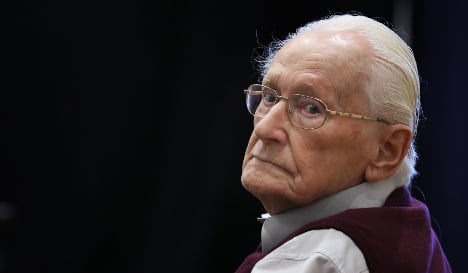Oskar Gröning, 94, was convicted by a court in the northern German city of Lüneburg of accessory to murder in 300,000 cases of Hungarian Jews sent to the gas chambers from May to July 1944.
One of his attorneys, Hans Holtermann, told AFP he had now taken his case to a higher tribunal, the Federal Court of Justice.
Gröning's lawyers had argued during the three-month trial that his role at the extermination camp in Nazi-occupied Poland had been “minor” and demanded an acquittal.
Prosecutors sought three and a half years' jail for Gröning based on the “nearly incomprehensible number of victims”, but mitigated by “the limited contribution of the accused” to their deaths.
The court, in surpassing the prosecution's sentencing demand, said the defendant had willingly taken a “safe desk job” in “a machinery designed entirely for the killing” of human beings.
Gröning served as an accountant at Auschwitz, sorting and counting the money taken from those killed or used as slave labour, and shipping it back to his Nazi superiors in Berlin.
Holocaust survivors and victims' relatives who were co-plaintiffs welcomed the verdict as a “very late step toward justice”.
Court observers say it is unlikely Gröning, who was not in custody during the trial, would ever serve time in prison given his advanced age and deteriorating health.
Any sentence would only begin after his appeal has been heard, and then a medical team would evaluate whether Gröning is physically capable of withstanding incarceration.
Some 1.1 million people, most of them European Jews, perished between 1940 and 1945 in the Auschwitz-Birkenau camp before it was liberated by Soviet forces.
Gröning's trial was based on a legal precedent set only in 2011 that having worked at a concentration camp is enough to establish culpability in murder. It is expected to be one of the last of its kind.


 Please whitelist us to continue reading.
Please whitelist us to continue reading.